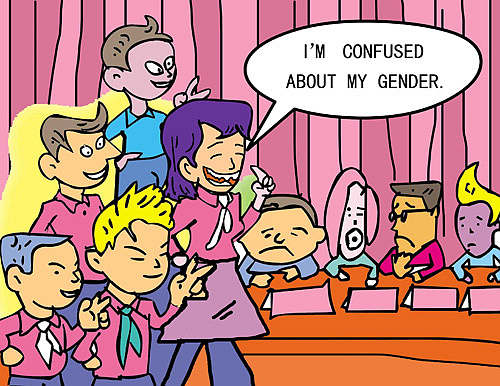|
 |
|
(LI SHIGONG) |
Nineteen-year-old Liu Zhu shot to fame when he participated in Happy Boys, a talent show on Hunan TV, not for vocal ability, but dressing style.
Auditioning for the show, Liu dressed, acted and spoke so femininely that the judges questioned his gender several times.
Local media and netizens have nicknamed Liu a nisemusume or "pseudo girl," a Japanese term for a male who cross-dresses in games. The "pseudo girl" term was also used to label several other cross-dressing contestants.
The new phenomenon has stirred up debate in China. Opponents say they believe these are blatant attempts by the TV broadcaster and the contestants to grab audience attention, and it is an example of social degradation. Supporters say, as long as cross-dressers have positive attitudes toward life, caring hearts and healthy minds, nobody should criticize them for acting like women. Cross-dressing shows only individuals' aesthetic preferences, they say, and it is normal for an open society to have cross-dressers.
Sociologist Li Yinhe said people's prejudices against cross-dressers were based on the fact people tend to associate normalcy with the majority of the population and feel uncomfortable with minority sex orientation and choice of clothing.
Pro-choices
Lei Zhenyue (Shenzhen Economic Daily): The way one dresses is an individual's own right, and should not be subject to interference from other people.
I would rather hail "pseudo-girls" as "courageous and creative people who dare to break traditions." It takes time for any new phenomenon to go from being alien to being accepted by society. During the process, these phenomena have to face people's questioning and disapproval. These cross-dressers must have already been under enormous pressure to stand up against tradition. If you don't applaud them, please don't bash or humiliate them.
Some people believe cross-dressers being lately frequently reported on in the media are sick, but their so-called sickness has created a new form of performing arts in China where a man impersonates a woman beautifully and vividly. There is nothing wrong with using it to grab audience attention during a competitive show. After all, any performance on television wants to win a large audience.
Now competition between different television channels is fierce. To achieve high ratings, television program producers have to explore new cultural elements. From this perspective, the emergence of "pseudo-girls" mirrors cultural diversity. People who detest this phenomenon for its cross-gender nature and call cross-dressers sick people are overreacted.
Sun Haiqiang (hlj.rednet.cn): Liu Zhu's physical build, body movements and the way he talks make him more like a woman than a man. This is not Liu's fault and certainly shouldn't be a reason for public censure. People are largely unable to choose their looks and personality, just as we do not choose our parents. Even if Liu's dressing style and manners result from his personal choice, we have no right to interfere since he has the freedom to live his own life.
It has been reported Liu's parents and Liu himself once tried hard to change his image, but these failed attempts caused Liu extreme pain.
Instead of fooling the audience, Liu revealed his true self to them and expected people's respect in return. When we debate whether Liu's acts are acceptable, we unconsciously violate Liu's legal rights by degrading or condemning him.
Some people totally ignore other people's rights while stressing their own. The harmonious society we have been trying to build in China is a tolerant one where people are equals and individuality and differences are tolerated and respected. These are requirements of relationships between individuals as well as a fundamental of law.
Mainstream value
Fang Yunfeng (Qianjiang Evening News): "Pseudo girls" do not become famous for being beautiful. Their appearance satisfies many people's desire to pry into other people's privacy and take pleasure from it. It has become an unhealthy trend for us to make fun of people's abnormal ways.
With the popularity of "pseudo girls" in the media, we cannot help worrying whether children's aesthetics will be distorted as a result. Will boys, especially those living in divorced families with mothers and female relatives, start to think only girlish looks are beautiful? If all men started to dress like women, how would women's dressing styles be supposed to evolve? Are women supposed to dress like men?
"Pseudo girls" do have the freedom to choose their own lifestyles, but their preferences are not mainstream society's values. Therefore, the media should not report them as if they represent mainstream thought. Meanwhile, I also want to advise these "pseudo girls" to stop going to extremes to seek media exposure.
Ding Wei (Xi'an Daily): Many scholars use the fact of men playing women's roles in Peking Opera to support the emergence of "pseudo girls." They argue since males mimicking females can be accepted in such a splendid art form, it also can be done in talent shows. But these are totally two different cases. In Peking Opera, males playing female roles has developed into a branch of the art and audiences enjoy watching how vividly male performers imitate gestures, gaits and vocal skills of females. By contrast, "pseudo girls" are not competing to show their talent in this regard, but simply competing to wear the most bizarre clothing to grab people's attention.
Therefore, the "pseudo girls" phenomenon has nothing to do with performance talent or society's tolerance. It is purely for fame and money. The popularity of "pseudo girls" is to cater to abnormal desires to watch unconventional and bizarre behavior in our society. Therefore, the more absurd the acts are, the more attention they attract. To cater to people's low tastes, those who want fame overnight have to act abnormally.
Although we cannot totally ban "pseudo girls," we shall not let them become a new trend. TV broadcasters shouldn't help to popularize this phenomenon simply to obtain good ratings and advertisement revenue. As a form of mass media, TV programs, even entertainment programs, do to some extent affect people's cultural perceptions. | 